Nigeria's Benin Bronzes Museum Falls Short: Clay Replicas Replace Looted Treasures


Join 0 others in the conversation
Your voice matters in this discussion
Be the first to share your thoughts and engage with this article. Your perspective matters!
Discover articles from our community

 Hoppi
Hoppi

 Hoppi
Hoppi

 Hoppi
Hoppi

 Hoppi
Hoppi

 Hoppi
Hoppi

 Hoppi
Hoppi

Egyptian Authorities Reveal Shocking Theft of 3,000-Year-Old Gold Bracelet CAIRO, EGYPT - In a stunning revelation, Egypt's interior ministry announced …

Hoppi

Egyptian Authorities Reveal Shocking Theft of 3,000-Year-Old Gold Bracelet CAIRO, EGYPT - In a stunning revelation, Egypt's interior ministry announced …

Hoppi

West Africans Deported from US to Ghana 'Dumped Without Documents in Togo' LOMÉ, TOGO - In a shocking turn of …

Hoppi

Egypt Unveils Restored Tomb of Pharaoh Amenhotep III After Two Decades of Renovation LUXOR, EGYPT - The Egyptian Ministry of …

Hoppi

Restitution Row: How Nigeria's New Home for the Benin Bronzes Ended Up with Clay Replicas LAGOS, NIGERIA - The long-awaited …

Hoppi

Egyptian Authorities Reveal Shocking Theft of 3,000-Year-Old Gold Bracelet CAIRO, EGYPT - In a stunning revelation, Egypt's interior ministry announced …

Hoppi